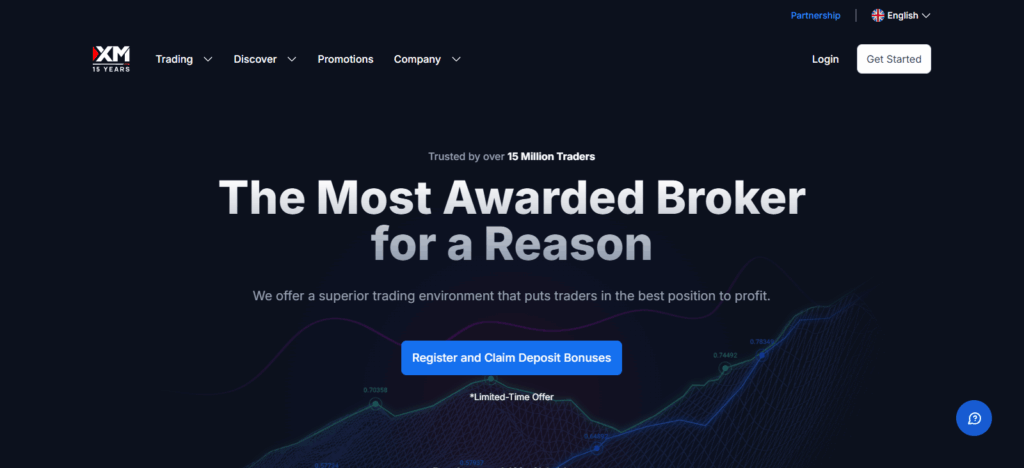In this piece, I highlight the primary differences between eToro and XM for traders selecting a platform in 2025.
They are both well-known and regulated brokers, but each has its benefits. eToro is best known for social trading and multi-asset investing. XM, on the other hand, specializes in forex and CFD trading, offering advanced tools and lower spreads.
What is eToro?
Founded in 2007, eToro is an online brokerage with an easy-to-use interface and social trading features. It offers the ability to trade and invest in stocks, crypto, forex, commodities, indices, ETFs and more.

It is regulated under several authorities including the FCA, ASIC, and CySEC, and provides modern secure trading facilities with emerging risk management tools.
eToro’s CopyTrader feature is especially valuable to novice traders as it allows them to replicate the trading strategies of successful investors. eToro is available in more than 140 countries, and is recognized as the most advanced provider of digital investing.
What is XM?
XM has gained and maintained the trust of the online trading community since it was founded in 2009. Considered one of the leading online forex and CFD brokers, XM has more than 1,000 trading instruments accessible.
These include various currency pairs, stocks, indices, commodities, and energies. With a reputation shielded by the likes of CySEC, ASIC, and IFSC, the trust within the community coupled with protection of the investments is guaranteed.

XM is remarkable for its transparent pricing and MetaTrader 4 and 5 platforms, providing XM clients and traders advanced trading chart and bot capabilities and instant execution.
XM provides zero-commission trading, various accounts for different skills and levels, and trading options. XM has a reputation for providing top-shelf customer service in multiple languages, making it profitable and accessible for forex trading.
Key Differences: eToro vs XM
| Feature | eToro | XM |
|---|---|---|
| Founded | 2007 | 2009 |
| Regulation | FCA, CySEC, ASIC, etc. | CySEC, ASIC, IFSC, etc. |
| Main Strength | Social & Copy Trading | Forex trading with tight spreads |
| Trading Platforms | eToro Web & Mobile (proprietary) | MT4 & MT5 (industry standard) |
| Asset Coverage | Forex, Stocks, Crypto, ETFs, Commodities, Indices | Forex, Stocks CFDs, Indices, Commodities, Metals, Energies |
| Crypto Trading | ✅ Yes (wide selection) | ❌ Limited / Only crypto CFDs depending on region |
| Minimum Deposit | Starts from $50 (varies by country) | From $5 for Micro/Standard accounts |
| Spreads | Higher spreads (no commissions on stocks) | Tight spreads (as low as 0.0 pips on Zero Account) |
| Copy Trading | ✅ Available (CopyTrader & Portfolios) | ❌ Limited or through third-party services |
| Leverage | Up to 1:30 (retail EU/UK) | Up to 1:30 EU/UK, up to 1:1000 globally (varies by entity) |
| Order Execution | Market execution | Fast execution with no requotes |
| Education & Research | Good, focuses on beginners | Strong education for forex traders |
| Suitable For | Beginners, social & crypto investors | Active and professional forex traders |
Who Should Choose eToro?
- Beginners and casual traders who need a user-friendly platform and don’t require advanced trading functionalities.
- Social and copy traders, as well as investors wanting to replicate the trades of more seasoned traders, thanks to eToro’s CopyTrader and other Smart Portfolios features.
- Crypto investors wanting to combine their investment in traditional assets with a diversified portfolio of cryptocurrencies.
- Multi-asset investors who prefer unified access to stocks, ETFs, forex, and commodities, crypto along with other assets.
- Long-term investors who want to enjoy a 0% commission benefit of real stock trading.
- Users who enjoy community engagement through feeds and other interactive features like trader profiles and strategies.
- Mobile-focused traders looking for a seamlessly designed app experience.
Who Should Choose XM?
- Active forex and CFD traders searching for a broker specifically tailored to the traditional markets and tight execution.
- Traders looking for industry-standard platforms like MetaTrader 4 (MT4) and MetaTrader 5 (MT5) with advanced charting and algorithmic trading (EAs) with custom indicators.
- Those preferring low spreads and little slippage, especially for currency pairs and highly liquid markets.
- Traders that are comfortable with a more professional interface rather than social-trading features.
- Those dealing with forex, commodity, metals, and energies rather than primarily stocks or crypto.
- Intermediate to expert traders with multiple account types (Micro, Standard, Zero) and high (leveraged) accounts (outside certain regulatory caps).
- Those seeking strong educational resources and research aimed at active traders.
Regulation & Security
eToro
- eToro is regulated in several jurisdictions: for example the UK arm, eToro (UK) Ltd, is registered with the FCA with Firm Reference Number 583263.
- For Europe, eToro (Europe) Ltd is regulated by the Cyprus Securities and Exchange Commission (CySEC) under licence 109/10.
- The scope of regulatory disclosure includes investment services (CFDs, stocks, etc) and some ancillary services like crypto safekeeping and custody in certain jurisdictions.
- eToro’s regulated status and the jurisdictional scope requirements means that client funds paying for eToro services are held in segregated accounts and other security and client protection obligations apply.
XM
- Multiple Tier One authorities have been issued XM regulation. For example, Cyprus XM regulation issued by Cyprus Securities and Exchange Commission under license number 120/10.
- Other sets of jurisdiction XM regulation globally having different market setups. For instance, Australia Australian Securities and Investments Commission – ASIC.
- Public “Vulnerability Disclosure Policy” XM cybersecurity taken publicly is appreciated.
- Reputation: XM “multi jurisdictional regulation, robust security” is confidently stated by XM, having 15 million plus clients and serving over 190 countries.
Trading Platforms & User Experience
| Feature | eToro | XM |
|---|---|---|
| Platforms Offered | Proprietary web-and-mobile platform with built-in social features (copy-trading, community feed) | Industry-standard platforms: MetaTrader 4 (MT4) & MetaTrader 5 (MT5) |
| Mobile App UX | Designed for beginners: clean menu, easy navigation, social feed, demo account integration | Mobile app supports MT4/MT5 with advanced charting and tools; user-friendly but more geared to forex/CFD traders |
| Charting & Tools | Advanced charts, one-click trading, watchlists, social sharing of trades | MT4/MT5 offer deep charting, many technical indicators, algorithmic trading via EAs (Expert Advisors) |
| Unique Experience / Features | Social investing: copy top traders, view their trades, community interaction | Execution-focused experience: low latency, wide instrument range, tailored for active traders |
| Suitability | Ideal for beginners, social-investors, multi-asset portfolios | Ideal for forex/CFD traders, those who want MT4/MT5 platforms and more advanced customisation |
| Demo / Practice Account | Yes: virtual portfolio available for practice without risk | Yes: MT4/MT5 demo accounts available; strong for strategy testing |
Fees, Spreads & Commissions
| Fee Type | eToro | XM |
|---|---|---|
| Stock Trades Commission | 0% commission on real stocks. | Stock CFDs: 0 commission (for standard accounts). |
| Forex Spreads (EUR/USD approximate) | Variable; eToro lists from around ~1.5-4 pips for many pairs. | Standard account: ~1.6-2.0 pips; Ultra-Low/Zero account: as low as ~0.2 pips plus commission. |
| Crypto Commission | 1% commission on buy or sell of crypto. | Crypto trading via CFDs: spreads from larger values; details vary. |
| Withdrawal Fee | Flat $5 withdrawal fee. ( | Typically no withdrawal fee (depends on region/bank). |
| Inactivity Fee | Yes — e.g., inactivity fee after no logins for period. | Inactivity fee: ~$10/month after 90 days inactivity. |
Pros & Cons
eToro
Pros:
- Very intuitive interface which is perfect for beginners because it is easy to use.
- Excellent social features, as well as copy-trading options which enable users to follow and replicate other traders’ strategies.
- Excellent asset coverage. Stocks, ETFs, crypto, commodities, and indices – one account caters to various asset types.
- Zero commission on real stock trades which is very attractive to stock investors.
- Excellent brand trust and security as it is regulated in various jurisdictions.
Cons:
- Spreads as well as non-stock fees (e.g. crypto cash-out fees, cash-foreign fees, etc.) are higher than average in holders of specialist licenses.
- Advanced traders may find the analytical tools, system customisation, as well as execution and order filling to be less substantial than other dedicated platforms.
- Restricted business licenses for some jurisdictions and regional restrictions on services (e.g. crypto for US users).
XM
Pros:
- Excellent and fast execution technologies and infrastructure for the order types with the very popular MetaTrader 4 and MetaTrader 5 platforms.
- Competitive overall transaction fees, especially in “Zero” or premium account types, as well as wide selection of forex & CFD pairs.
- Very low minimum account deposit for several regions which is very helpful for beginners.
- Good education and research for traders and new users to improve their skills.
Cons:
- Compared to low-cost brokers, spreads on the standard accounts can still be a little wider.
- MT4/MT5 is a third-party trading platform offered. No proprietary platform which is the case for numerous brokers.
- Features social trading, copy trading, and certain asset classes but might be considered basic compared to dedicated brokers.
Conclusion
Your trading goals and experience determine the choice between eToro and XM. eToro suits beginners, long-term investors, and anyone who likes social and copy trading.
It offers a pretty broad selection of assets like stocks, ETFs, and even cryptocurrencies. Its platform is uncomplicated and is perfect for anyone who prefers a seamless trading experience.
Whereas, XM is best for active trading for forex and CFD where one is likely to need advanced features like MT4/ MT5 platforms, tight spreads, and quick execution.
Serious market participants who are after lower costs and professional control of the market will look to XM. Both platforms are secure and regulated, offering different strengths for different trader types.
FAQ
Which platform has lower trading costs?
XM offers narrower spreads (in some account types) compared to eToro, making it potentially less expensive for high-frequency or large-volume traders.
eToro may have more built-in service costs (cryptocurrency commissions, currency conversion fees) though it offers zero commission on many real stocks.
Which broker is better for beginner investors?
eToro is more beginner-friendly with its simplified interface, social/copy-trading features and multi-asset access.
XM is better suited for traders who are comfortable with more advanced tools and want tighter execution conditions.









